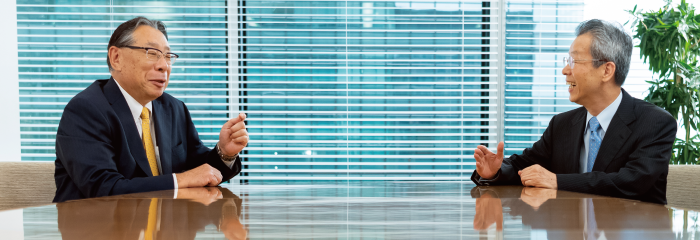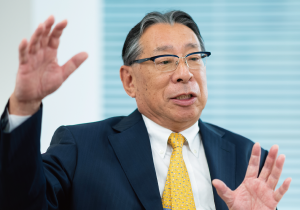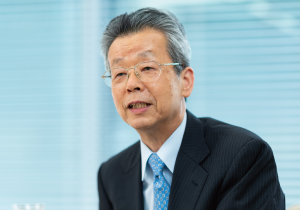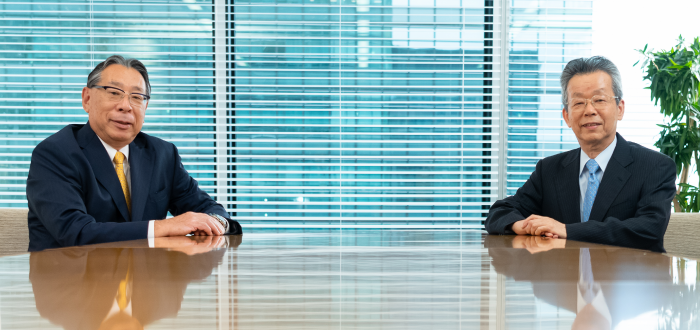A Dialogue between Two Outside Directors

Reforming corporate governance and bringing more value to the aluminum business with the goals of raising corporate value and achieving sustainable growth
Reforming corporate governance and bringing more value to the aluminum business with the goals of raising corporate value and achieving sustainable growth
Takahiro Ikeda (shown left) Director, Member of the Board (outside, part-time)
Over his career, Mr. Ikeda has served as an executive officer at Mitsubishi Chemical Corporation*, president of Dia Chemical Co., Ltd.*, and a director and managing executive officer at Mitsubishi Rayon Co., Ltd*. He has been involved in expanding business throughout the ASEAN region and the rest of Asia, including the expansion of Mitsubishi Rayon’s operations in Indonesia. *Now part of the current Mitsubishi Chemical Corporation
Akio Sakumiya (shown right) Director, Member of the Board (outside, part-time)
After serving as a director and executive vice president at Omron Corporation, Mr. Sakumiya turned his attention to management supervision as a non-executive director, serving as vice chairperson in various advisory committees, including a company president nomination committee. He also contributed to raising Omron’s corporate value by applying return on invested capital as a key performance indicator for management.
Over his career, Mr. Ikeda has served as an executive officer at Mitsubishi Chemical Corporation*, president of Dia Chemical Co., Ltd.*, and a director and managing executive officer at Mitsubishi Rayon Co., Ltd*. He has been involved in expanding business throughout the ASEAN region and the rest of Asia, including the expansion of Mitsubishi Rayon’s operations in Indonesia. *Now part of the current Mitsubishi Chemical Corporation
Akio Sakumiya (shown right) Director, Member of the Board (outside, part-time)
After serving as a director and executive vice president at Omron Corporation, Mr. Sakumiya turned his attention to management supervision as a non-executive director, serving as vice chairperson in various advisory committees, including a company president nomination committee. He also contributed to raising Omron’s corporate value by applying return on invested capital as a key performance indicator for management.
Offering support for management and corporate governance from different perspectives than those at UACJ
- ──
- What impression of UACJ did you have when you were appointed as an outside director?
- Ikeda
- I sensed that everyone in the Company is really serious and sincere about their work. When I reviewed documents prepared ahead of meetings of the Board of Directors, I thought they were very thorough and well organized. Later I toured numerous sections of factories, and, as expected of a manufacturer, the shop floor was full of energy, which really impressed me.
- Sakumiya
- My first impression was basically the same— UACJ appeared to be a very serious company. It seemed like all members would immediately deal with any problem that arose and work diligently to find a solution. On the other hand, if everyone is too serious and, in some respects, obedient, there will not be much thinking outside the box.
- ──
- What roles are you expected to perform as an outside director?
- Ikeda
- While working for a chemical material manufacturer for many years, I was involved in starting up operations in other countries and managing companies in Japan and overseas. While I was on the front lines of business back then, since I retired there almost three years ago, I gained even more opportunities to work with people from many different industries by providing assistance to a number of companies. In that process, I was able to discover things I didn’t know and to experience different ways of doing things. I think the Company expects me to draw from that experience and offer viewpoints that differ from its own personnel while supervising and assisting management.
- Sakumiya
- I served as an executive vice president at Omron Corporation up until June 2017, and it earned a reputation for being at the forefront of corporate governance in Japan. For instance, Omron adopted an executive officer system in 1999, and set up a personnel advisory committee and a nomination and remuneration advisory committee in 2003, ahead of most companies. In that context, I focused my energy on enhancing its corporate governance, and dedicated myself to supervising management as a non-executive director for six years from 2011. By making use of that experience, I think one of my roles as an outside director at UACJ will be to help reform its corporate governance.


Supporting a more effective corporate governance system and utilizing techniques for securing a higher return on invested capital
- ──
- How do you think you can apply your professional experience and expertise in UACJ’s management?
- Ikeda
- In the materials manufacturing business, progress is generally made through trial and error. In most cases, for every one success there is usually a series of repeated failures. When we failed, we analyzed the causes, but there were numerous times when we could not precisely identify the problem just by debating things within the company.
- Sakumiya
- I assume because everyone tends to develop similar lines of thinking when working at the same company.
- Ikeda
- That's right. But when we are exposed to diverse cultures and ways of doing things by working in different countries, interacting with people in different industries, and so on, we observe all kinds of things we had never noticed before. In UACJ’s case, it is a company that deals primarily in aluminum, and when seen from outside, its corporate culture appears insular in some respects, even if that is not perceived internally. In that regard, as an outside director, I would like to point out issues that tend to be overlooked inside the Company, which I hope will contribute to enhancing its corporate value.
- Sakumiya
- Given my background, I mainly want to help reform UACJ’s corporate governance. For example, although the Company has already shifted to a system that separates the management execution and supervision functions, now that the system is in place, the challenge going forward is making it more effective. I think my experience can be used to help optimize the workings of that system.
- Ikeda
- I understand that Omron began managing its return on invested capital (ROIC) before UACJ, which adopted ROIC as an important financial indicator from this fiscal year.
- Sakumiya
- Yes, Omron has been using ROIC as a basic tool in its operational management. Managing ROIC is advantageous because it allows the earnings power of various operations under different business models to be assessed using a common indicator. Omron also created an “ROIC reverse tree formula” for analyzing the components of ROIC at the accounting item level and setting specific goals for increasing ROIC in every workplace. Managing ROIC also facilitates business portfolio management and indicates which businesses should be targeted and focused on. Indeed, it is essential for decisions to shift operational resources to businesses that can generate earnings and withdraw from businesses that produce low profits. I think ROIC is a useful indicator if applied throughout a company’s operations, including its selection and concentration of businesses.
- ──
- Mr. Ikeda, given your extensive business experience in China and Southeast Asia, what advice do you have for UACJ with respect to its global expansion?
- Ikeda
- UACJ has been undertaking extremely large investments in Thailand and the United States in recent years. In emerging countries like Thailand, society is transforming at a remarkable speed, which is very different than the moderate pace of change here in Japan. Therefore, if we try to manage operations in such a country according to our usual practices in Japan, we will encounter a widening gap between how the operations are perceived at the worksites there. When managing operations in a different country, it is essential for headquarters to consider the actual circumstances there and be engaged with the worksites so they do not become isolated. In UACJ’s case, especially, since it has made such vast investments, rather than segmenting businesses under Asia and North America, both need to be treated as group businesses. That is UACJ’s biggest management challenge, and unless it is dealt with, I do not envision success in the future.
Enhancing the supervisory function of the Board of Directors while striving for sounder and more transparent governance
- ──
- Please tell us your views on UACJ's corporate governance?
- Ikeda
- I think more authority should be transferred to the Executive Management Committee and other committees so they can decide on agenda items now handled by the Board of Directors, because that would give us more room to deliberate on important matters related to aligning business strategies and maintaining sound financial affairs.
- Sakumiya
- I agree. The Board of Directors has both management and supervisory functions, but improving the supervisory function is regarded as more important in corporate governance reforms today. Therefore, UACJ will have to place more importance on the Board’s supervisory function while clearly distinguishing between management and supervision in the future. For that purpose, it will be necessary to limit the number of agenda items that can be fully deliberated, and also to ensure that an appropriate number of members attending meetings of the Board are responsible for supervision.
- Ikeda
- When proposals are made in Board meetings by members in charge of business execution, the viewpoints tend to be concerned with protecting their respective businesses. The Board of Directors is a venue for discussing things from a broad perspective that takes the whole company into account. Therefore, to enable even more objective discussions, especially in connection with proposals for supervising business execution, it may be necessary to adjust the proportion of the members who are concurrently responsible for business execution and the members who are not.
- Sakumiya
- At UACJ, outside directors are provided with very comprehensive documents and information, so we can get a full picture of its operations and financial situation. On the other hand, if we consider the role of outside directors as supervising management on behalf of shareholders, instead of taking into account all of that detailed information, we need to make decisions from a broader perspective. Because we also have experience in management, we may be inclined to get deeply involved in it, which creates the risk of adopting the stance of managers rather than of shareholders.
- Ikeda
- Indeed, there are many challenges, but fiscal 2018 is the first year of UACJ’s rebirth, so to speak, so we have an opportune time to really accelerate corporate governance reforms. By continuously sharing our views with members of the Board and executive management organizations, I hope we can make UACJ’s corporate governance sounder and more transparent.
- ──
- Both of you are members of the Nomination and Remuneration Advisory Committee that was established in October last year. What are your views on the committee’s activities and what would you like to see going forward?
- Ikeda
- The committee provides a concrete process for nominating new corporate officers, but to elect really outstanding officers in the future, it is necessary to have a system for grooming and selecting excellent candidates from among the Company’s own employees. I would like the committee to examine how effectively UACJ can do that now, and discuss what kind of framework should be put in place if the current system is insufficient.
- Sakumiya
- To create a management succession plan, the process for grooming corporate officer candidates is essential, so, as you said, we will need a training program for middle management. That means we have to look about 10 years ahead, so we also need to discuss how the entire human resources system should be structured.
- Ikeda
- When setting up any system for evaluating employees and setting career goals, we must make sure it is up to date with the latest developments. Rather than just following the models used in the past, we need to make such systems more impartial and trustworthy, and incorporate the most recent innovations in information technology and artificial intelligence.
- Sakumiya
- I would also add that after reviewing the remuneration system for directors, we made it comply with Japan’s Corporate Governance Code, such as by incorporating incentives linked to improving performance over the medium term. Since this system has been put in place, however, I would like the committee to monitor it appropriately, verifying that the system functions properly from hereon and that the incentives for improving performance actually work.

Promoting a more diverse corporate culture and adding value to our businesses
- ──
- Finally, what do you think will be UACJ’s key challenges in the future?
- Ikeda
- For UACJ to continuously grow in the global market and raise its corporate value, increasing the diversity of its organizations and corporate culture will be vital. Even if an organization is made up of 100 talented and dedicated members, it will be more dynamic if just one or two members are different in some way. There are times when conflicts arise from diversity, but such conflicts can bring about reforms and innovation if they are converted into positive opportunities. Therefore, we should make the most of the diverse attributes and backgrounds of employees in the future. In Japan, there has been a long tradition of rejecting non-conformists, including in human resources development, but now we need to consider how to foster such individuals.
- Sakumiya
- For UACJ to be a more attractive company for investors, I think it will be important to refine its technological and product development capabilities, and beat out the competition by supplying high-added-value products and services rather than competing for volume. To accomplish that, in addition to developing new products, UACJ must also enhance its capabilities across the board, including innovations to production processes and business models. Unless we add more value to our businesses and boost profitability, the aluminum industry itself could become less attractive for investors. While bearing that in mind, I would like UACJ to continue focusing on creating more value in the future.
